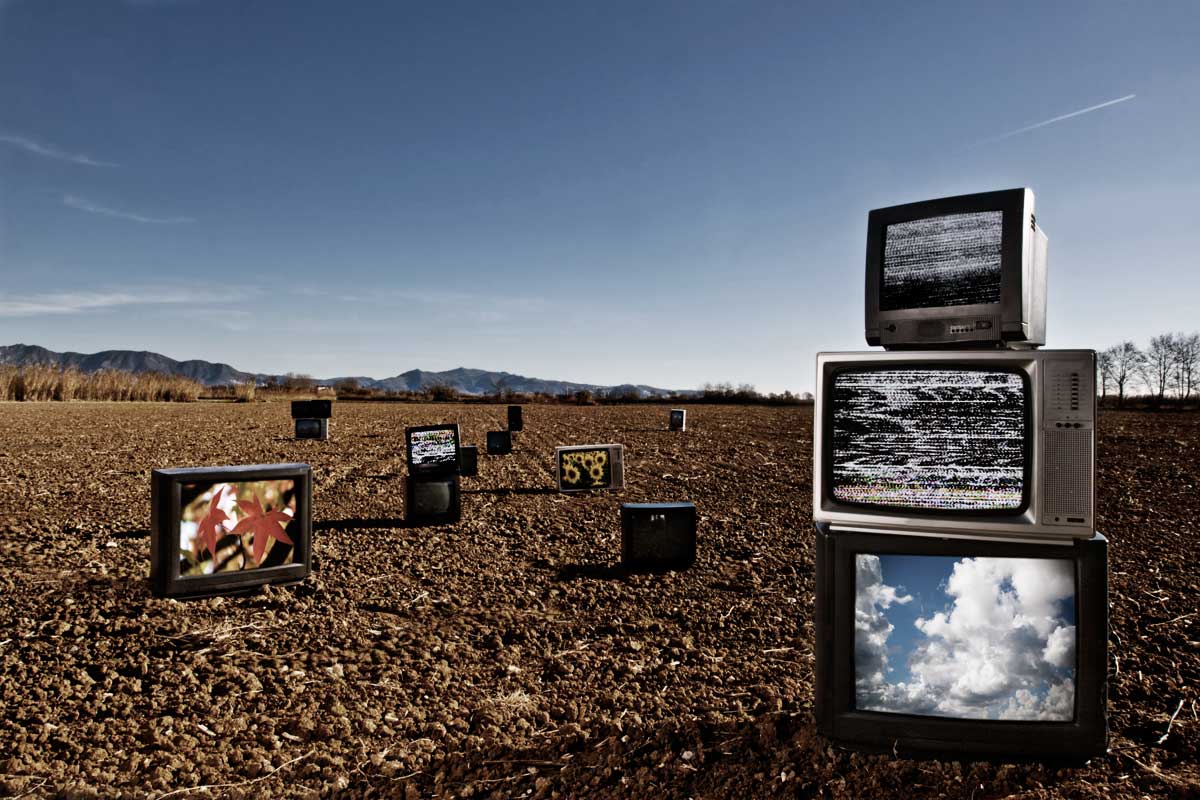How Now Shall We Bear Witness?
After a Century of Retreat, Can Christians Now Engage the Culture?
by Russell Hittinger
This article was adapted from a talk given by Dr. Hittinger as a workshop on “How Christianity Plays Out in Religion and Philosophy” on October 16, 1999, in Colorado Springs, Colorado, at a conference sponsored by the Wilberforce Forum, “The Christian Mind in the New Millennium.”
I am pleased to be here to discuss Chuck Colson and Nancy Pearcey’s new book, How Now Shall We Live? In about 70 days the Christian world will celebrate the 2,000th birthday of Jesus Christ, the God Incarnate. As we enter the third millennium of Christianity, Colson and Pearcey’s book helps us to take stock of the signs of the times.
If I were standing before this audience 100 years ago, I would have had to give you a very dismal report of the signs of the times. I would have reported that although Christianity continued to be observed by most of the common people in Western culture, it had lost almost all of its contemporary battles with the intellectual elite: that is, with philosophers, scientists, educators, journalists, and politicians.
The nineteenth century was the high tide of modern atheism: Socialism, Marxism, Darwinism—in America, social Darwinism—Freudianism, Pragmatism, and myriad other “isms” that were either atheistic in principle or operationally atheistic. The operational atheist might not deny outright the existence of God or transcendent truth, but he was convinced that such things were useless for any respectable, adult use of the mind.
The Retreat of Public Religion
Reading the signs of the times a century ago, many Christians concluded that they had no option but to relinquish claims to any public order of propositional truths. Indeed, it would have been my unpleasant task to point out that large sectors of the Christian churches had folded their tents, at least intellectually. In seminaries, in universities, and in pulpits throughout Western Christendom, theologians came to believe that they could defend Christianity only by defending generic religion, and that religion could be defended only on the subjective ground of piety. Take, for example, one of the most influential Protestant theologians of the nineteenth century, Friedrich Schleiermacher. In On Religion: Speeches to Its Cultured Despisers (1799), Schleiermacher wrote: “In order to make quite clear to you what is the original and characteristic possession of religion, it resigns, at once, all claims on anything that belongs either to science or morality. Whether it has been borrowed or bestowed, it is now returned.”1
What is Christianity without truth claims about morality and about the nature and destiny of the created world? The answer, for Schleiermacher and for much of the Christian world, seemed obvious: Christianity could claim some place in people’s lives as piety or a merely personal faith. It was something that might help one get along in the world, not because its truths have any bearing upon the perennial questions of philosophy, science, public affairs, or even theology, but because it gives psychological comfort and meaning to the individual soul. Even Scripture itself was to be given over to the scholars, who would make authoritative judgments about the Christ of history. The Christ of faith was to remain a merely private, personal thing.
As an educated American audience 100 years ago, you certainly would have read the work of William James, who argued in Will to Believe and in Varieties of Religious Experience that religious experience is good not because it is true but because it is therapeutic. James wrote that religious experiences have every right to be authoritative over the individuals to whom they come, but “no authority emanates from them which should make it a duty for those who stand outside them.”
Almost every mainline Protestant church was deeply affected by this movement, which essentially conceded defeat over scientific and philosophical issues. One branch of pietism was “liberal” in the sense that it not only conceded defeat but also enthusiastically endorsed the authority of modern worldviews in matters intellectual. Of course, in North America, this movement sparked a vehement reaction, sometimes called “fundamentalism.” But it, too, tended to play by the new rules of the game. Which is to say that personal religious experience and piety defined the orbit of acceptable religion. Although fundamentalism endeavored to protect the Bible from being deconstructed by scholars, it did so only at the cost of removing the Scripture-based worldview from all of the intellectual disciplines. To my knowledge, late nineteenth-century and early twentieth-century fundamentalism did not produce a single serious piece of intellectual work in science, philosophy, psychology, anthropology, or in legal or social theory.
In sum, the report from 100 years ago would not have been very promising. Christianity had accepted defeat at the hands of intellectual modernism. Christians were correct in noticing the signs of the times—the Christian worldview had ceased to command the allegiance of intellectuals. They were, however, wrong in interpreting what the signs meant. Rather than defending an order of truth capable of winning authority, they retreated. And this retreat into pietism, rather than providing a safe haven, made Christianity look even more irrational—the prejudices of subjective “religious” experience, usually of uneducated people. I hope it is clear, then, that by “pietism” I do not mean the virtue of piety. Rather, I mean a preoccupation with private religious experience that ceases to be interested in God in se, regarding him chiefly as a bonum mihi. As Karl Barth warned earlier in this century, this preoccupation spells the death of theology.
The Fall of Modernism
The main “sign” of our times is that intellectual modernism has lost its “faith.” Once upon a time, people really believed that the modern philosophies, sciences, and social theories would provide an order of truth to replace the worldview of Christendom. The modern “isms” were proposed as true, defended as true, and hoped in as true. We need to give credit where it is due to the “modern” worldview. It was not shy in defending modernism as true; nor did it hesitate to impose its conception of truth upon public institutions. From Kiev to Lisbon, and from London to Chicago, the modern intellectual elites created a mandatory system of education to bring the minds of the masses into the light of truth, as they understood it.
In his famous Terry Lectures, given at Yale in the 1930s, John Dewey called it the “common faith.” In short, the “common faith” is belief that scientific rationality, emancipated from all claims concerning transcendent truth, would inevitably produce a civilization worth living in.
At the end of the twentieth century, this secular “faith” is in tatters.
Today, it is widely believed that claims about the human condition—who and what is man, where did he come from, what makes him good, what is his destiny—are mere private opinions, which, if used as standards for public judgment, would constitute grave violations of individual freedom. Ironically, the modern mind, seemingly at its moment of triumph, consigned itself to the very place to which it wanted to exile religion, namely, to the sphere of private, subjective, lifestyle choice that can make no claim to universality, and where truth does not matter so much as whether opinions work for facilitating one’s lifestyle.
The signs of this are everywhere in Western culture today.
For example, the most influential political philosopher of our generation, John Rawls (at Harvard), recently argued that pluralism of opinion about worldviews makes it unjust for government to prefer any worldview. He concludes:
Government can no more act to maximize the fulfillment of citizens’ rational preferences, or wants (as in utilitarianism), or to advance human excellence, or the values of perfection (as in perfectionism), than it can act to advance Catholicism or Protestantism, or any other religion. None of these views of the meaning, value, and purpose of human life . . . is affirmed by citizens generally, and so the pursuit of any one of them through basic institutions gives political society a sectarian character.2
Interestingly, what makes for sectarianism, in Rawls’s understanding, is not religion per se—certainly not religion in its traditional sense as consisting of creed, cult, and church—but rather any comprehensive view of human life. Rawls emphasizes that although liberalism began by protecting the secular and civil sphere against religious sectarianism, liberalism now must also protect the public sphere against liberalism as a worldview. In one fell swoop, all of the intellectual achievements of modernity are dumped into the same category as religion and theology.
The Fear of Truth
In the same vein, our Supreme Court has insisted that when personal liberties are at stake, the individual has a rightful immunity from philosophic concepts imposed by society or the state. In Planned Parenthood v. Casey:
Our obligation is to define the liberty of all, not to mandate our own moral code. The underlying constitutional issue is whether the State can resolve these philosophic questions in such a definitive way that a woman lacks all choice in the matter. . . . At the heart of liberty is the right to define one’s own concept of existence, of meaning, of the universe, and of the mystery of human life. Beliefs about these matters could not define the attributes of personhood were they formed under compulsion of the State.
What is so interesting about this declaration is not just what the Court says about the issue of abortion, but what it says about public standards of truth. For the Court insists that the individual is immune not merely from restrictions on liberty that derived from religious belief, but also from science, philosophy, and, apparently, from any judgment of truth and falsity other than what is supplied by the woman and the Court itself. In fact, the Court certainly seems to suggest that were the woman subjected to a public judgment of truth she would lose her very personhood.
Truth and judgment are reduced to power. And given the contest between powers, the best that a liberal society can say is that we ought to defer to the individual’s power over himself—unless of course the government can show some absolutely pressing public need for constraint. Since the public is not permitted to define its needs in light of any religion, philosophy, or worldview, it is very difficult for society to supply a reason to limit individual liberty.
In their book, How Now Shall We Live?, Colson and Pearcey have included many instances of this phenomenon: modernity has become so disillusioned with its own mind that it fears judgment—not just religious judgment, but any judgment that would limit individual freedom. Indeed, for all practical purposes, liberty today could be defined as that sphere in which the individual is immune from objective measures of truth, including any philosophies that seek to define what that sphere is in the first place. No doubt, this is why, in the waning decades of the twentieth century, we permit courts to resolve disputes of a philosophical nature. For courts can simply issue a rule unilaterally, without debate, and without anyone being able to talk back.
Who Cares?
So, in one important respect, the situation is far worse today than it was a century ago. The great ideologies of modernity were proposed as true, which meant they could, in principle, be shown to be false. Today, on the other hand, there is almost no engagement of the big questions for which the modern mind thought it had, or would soon have, answers.
At the beginning of the book, Colson recounts how he went to Yale Law School to lecture on the moral and philosophical bases of the rule of law. He discovered what those of us who work in schools have to face every day. Unless one argues for a restriction on rights of minorities—unless one pushes the most emotionally hot buttons—the students will not argue back. Most students today have no allegiance to any particular worldview, religious or modern. Their only worldview is one held by default: that one can get along comfortably in life without ever having asked, much less answered, the perennial questions of philosophy and theology; that a market-oriented culture of individual liberty will pretty much take care of itself and everyone in it.
What is the meaning of these signs of the times? As I pointed out, a century ago many Christians misinterpreted the signs of their times. In the face of an aggressive and confident modernism, they folded their intellectual tents. If I correctly understand Colson’s book, we do not want to make the same mistake today.
As Colson notes in Chapter 31, some battle-weary Evangelicals have resigned themselves to the fact that the so-called culture war is lost. In reality, however, the culture war was lost a long time ago when Christianity substituted pietism for a serious engagement with modern science and philosophy. What we see today are not the signs of a lost culture war, but of lost souls who have neither the truths of their Christian ancestors nor the intellectual confidence of the moderns. Perhaps you remember a book published a decade ago: Allan Bloom’s The Closing of the American Mind. The title is perfectly descriptive.
Politics or Piety
How are we to respond?
The first option is for Christians to mobilize politically to counteract the slide of the culture into further disillusion and ultimately into nihilism. We’ve tried this route over the past thirty years, with mixed results. Politics is truly successful when there is significant agreement about a worldview. Politics works best when it mobilizes people with regard to the means for a commonly agreed upon end; it is not very reliable for forming consensus about ends. The fact is that cultural and political authority has not fallen, by default, to Christians. The collapse of our modernist rivals has not created a surfeit of authority that we can pick up and use. In reality, there is a vacuum of authority, and the hole cannot be filled in by politics alone.
Much of our society is already prone to confuse propositions about the truth with mere assertions of power. They fear public standards of truth about human conduct. It doesn’t seem to matter whether those standards are modern atheistic ones or old-fashioned Christian ones. This, in my view, explains what might be called the political paradox of the so-called Christian Right. It can get electoral majorities to support the proposition that a woman does not have an absolute right to procure an abortion, or for the proposition that there ought to be prayer in public schools, but the moment the Christian Right actually tries to cash in the political chips, there is the inevitable backlash. The political Left often faces the same backlash. So far as I can understand it, the reason for this phenomenon is that no worldview commands the allegiance of the people and that they get nervous whenever one comes into view through political debate.
Again, this is no argument for becoming quietists. Some political battles have to be fought. But we have to understand why political success sometimes leaves Christians further behind than ahead in winning hearts and minds.
Another, and contrary, option is to believe that the Christian faith can function perfectly well where people have no well-developed philosophical convictions of any sort. Why worry about the culture at all? The failure of modernism guarantees that nothing remains but faith. So we have a second chance to make pietism work. I think this represents a greater temptation than the first, political option. Two centuries ago, Hegel described it as the mindset that relishes a night in which all cows are black. If everything is faith, then no particular faith is criticizable by rational standards.
Christians already tried this more than a century ago when opting for a piety shielded from philosophy and science. It didn’t work then, and it is hardly apt to work now. Why? Because any Christianity worth defending holds itself out as true—not merely for the individual, but true for all of reality. Reasonable men and women intuitively understand that Christianity cannot be true only for the Church, as though a completely different and unrelated order of truth pertains to everything else. Authentic Christianity requires conversion of the whole man—his mind and his actions as well as his heart. Pietism appeals to the conversion of the heart; politics and ethics appeal to action; but there is still conversion of the mind. And the mind rebels at any dichotomy between the truths of religion and the truths of the world, as it were. Given the upwardly mobile, educated character of our congregations today, it is quite unlikely that pietism will yield lasting results. There are momentous decisions that will have to be made about our civilization in the next century. For instance, we are within a generation of being able to clone human beings. This is not a question of the heart or of politics, it is a question that, of its very nature, requires us to have intellectual clarity about the nature of man and what God intends for man. We will have to study the Scriptures, and our ecclesial traditions and authorities, but you have to admit that the answer to something like human cloning is not readymade. And even after we are able to understand the problem for ourselves, we still must be able to communicate it to others.
Charity to the Fallen
Another way to interpret the signs of the times is to emphasize, as do Colson and Pearcey, that postmodern disillusion has given the Christian churches an enormous opportunity and responsibility. Who is left to give an answer to the question, quid sit homo—who is man? The moderns believed that they could answer this question—it was their bragging right to have done so. But they have given up. As we have seen in the case of abortion, they refuse even to give a scientific answer to the question. After claiming individual rights, the postmodernist has nothing left to say. The intellectual poverty of the position could not be more apparent.
It is frequently the case today that religious believers find themselves in the role of defending the ability of the mind to pursue and know the truth. On the abortion issue, for example, it is believers who typically argue from premises of science, philosophy, and law. The partisans of choice argue from something subjective. On matters of law, especially constitutional law, it is believers, largely, who emphasize the intellectual framework of the American Constitution. Universal and inalienable human rights have no better defender today than Christians. And perhaps the biggest reversal from a century ago is that believers are reopening the broader philosophical and theological questions about biology. Almost everyone knows that the most creative developments in education today are being undertaken by faith-based schools and families. In Tulsa, for example, the most interesting new school, St. Augustine’s, was recently founded by Evangelicals from several different denominations. The curriculum is based upon the traditional liberal arts: logic, grammar, rhetoric, Latin, and Greek. And this is not to mention the startling success of the Prison Fellowship Ministry with respect to reform of the penal system.
We see, then, Christians learning how to preserve the very things that modernity thought it had got right: defense of human life, the rule of law, universal and inalienable human rights, the pursuit of scientific evidence wherever it might lead, and education. On each of these fronts, the disillusioned postmodern mind would abandon not merely the achievements of the premodern Christian culture, but also the achievements of modernity itself.
St. Augustine wrote: “For on whatever place one has fallen, on that place he must find support that he may rise again.” The modern mind lost its way because it tragically abandoned truth. And it is precisely on that ground that Christians have to address the culture.
To do so, it will be necessary to shake off the old habits of fearing, retreating from, and perhaps hating the secularist mind. Secularism remains very strong in its material organization of culture; but the secularist mind is now in poverty. The great act of charity of Christianity in our times will be to reawaken a love of truth. And, like the monks of old, we will have to accept this mission without relying upon the instruments of cultural or political authority.
Notes:
1. Friedrich Schleiermacher, On Religion: Speeches to Its Cultured Despisers. Trans. John Oman (New York: Frederick Ungar Pub Co, 1955), p. 27.
2. John Rawls, Political Liberalism (New York: Columbia University Press, 1993), pp. 179–180.
Russell Hittinger, a Roman Catholic, is a research professor in the School of Law at the University of Tulsa in Oklahoma. He specializes in issues of theology and law. A former research scholar at the American Enterprise Institute, he has taught at Catholic, Princeton, Fordham, and New York Universities.
subscription options
Order
Print/Online Subscription

Get six issues (one year) of Touchstone PLUS full online access including pdf downloads for only $39.95. That's only $3.34 per month!
Order
Online Only
Subscription

Get a one-year full-access subscription to the Touchstone online archives for only $19.95. That's only $1.66 per month!
bulk subscriptions
Order Touchstone subscriptions in bulk and save $10 per sub! Each subscription includes 6 issues of Touchstone plus full online access to touchstonemag.com—including archives, videos, and pdf downloads of recent issues for only $29.95 each! Great for churches or study groups.
Transactions will be processed on a secure server.
more on culture from the online archives
more from the online archives
calling all readers
Please Donate
"There are magazines worth reading but few worth saving . . . Touchstone is just such a magazine."
—Alice von Hildebrand
"Here we do not concede one square millimeter of territory to falsehood, folly, contemporary sentimentality, or fashion. We speak the truth, and let God be our judge. . . . Touchstone is the one committedly Christian conservative journal."
—Anthony Esolen, Touchstone senior editor












